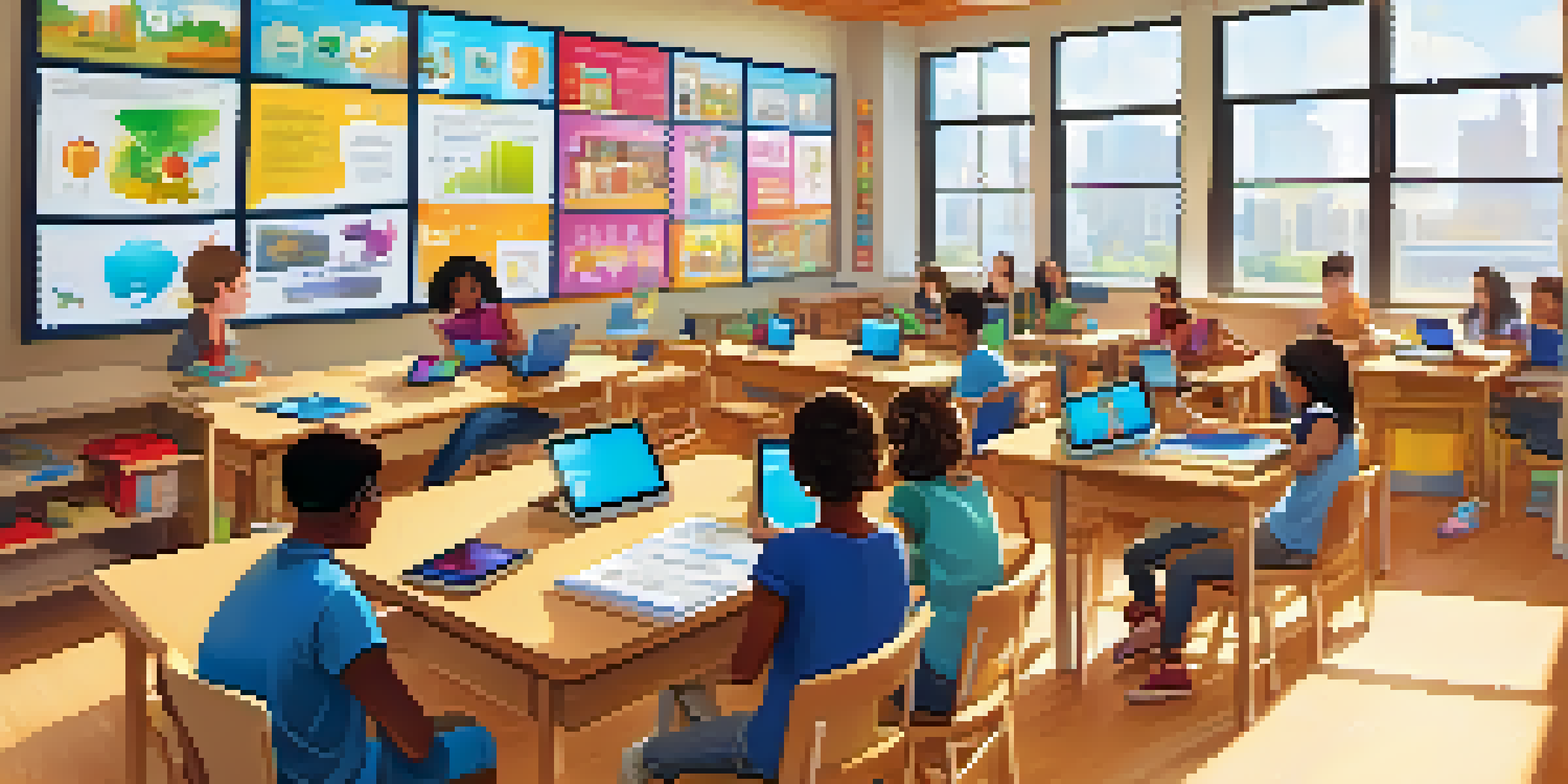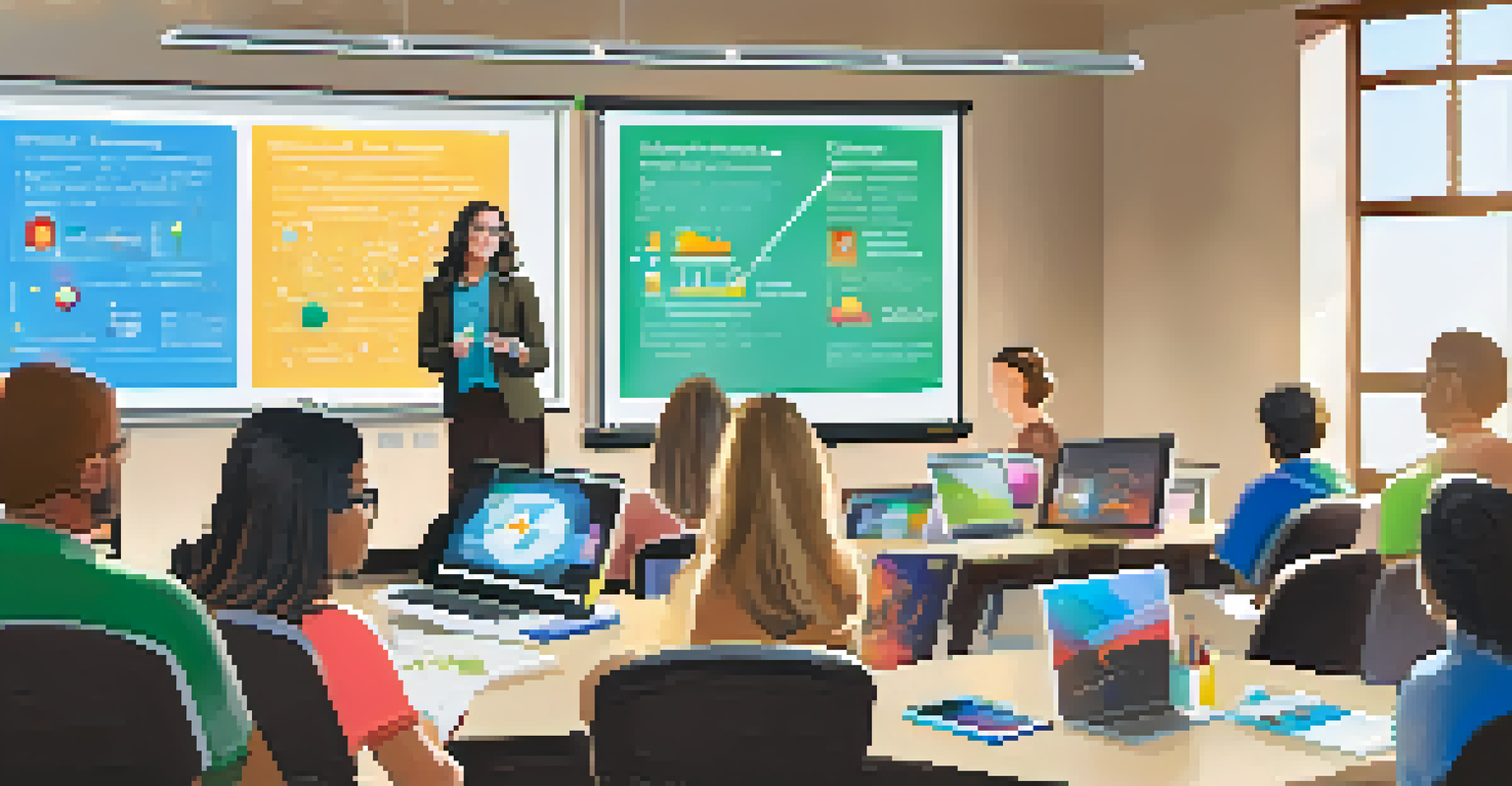Impact of Technology on New Jersey's Educational Landscape

The Digital Transformation of New Jersey Schools
New Jersey's educational landscape is undergoing a digital transformation, driven by the integration of technology in classrooms. Traditional teaching methods are evolving as schools adopt innovative tools that enhance learning experiences. For instance, interactive whiteboards and tablets are becoming staples, allowing teachers to engage students in more dynamic ways.
Technology will not replace great teachers, but technology in the hands of great teachers can be transformational.
This shift not only makes learning more interactive but also prepares students for a tech-savvy world. By using educational apps and online resources, students can explore subjects at their own pace, fostering a sense of autonomy in their learning journey. The accessibility of information online has also broadened horizons, making it easier for students to delve deeper into topics of interest.
However, this transformation comes with challenges, including ensuring equal access to technology for all students. Schools are working to bridge the digital divide, striving to provide necessary resources to underserved communities. As New Jersey continues to embrace technology, it is crucial to address these disparities to create a more equitable educational environment.
Remote Learning and Its Advantages
The COVID-19 pandemic accelerated the adoption of remote learning across New Jersey, showcasing the potential benefits of online education. Students adapted to virtual classrooms, allowing them to continue their studies from home while maintaining social distancing. This new format not only kept education afloat during uncertain times but also revealed new opportunities for learning flexibility.

Remote learning has empowered students to customize their educational experiences, offering various online resources that cater to different learning styles. For example, visual learners can benefit from video lessons, while auditory learners might prefer podcasts or discussions. This tailored approach encourages self-directed learning, helping students take charge of their education.
Digital Tools Transform Learning
New Jersey schools are integrating technology to create more interactive and personalized learning experiences for students.
Despite its advantages, remote learning also highlights the importance of maintaining social interaction among peers. Schools are now exploring hybrid models that blend in-person and online instruction, ensuring students reap the benefits of both worlds. This hybrid approach aims to foster collaboration and community while embracing technological advancements.
The Role of Educational Apps and Platforms
Educational apps and online platforms have emerged as powerful tools in New Jersey's classrooms, enhancing student engagement and learning outcomes. These resources offer interactive content, gamified learning experiences, and immediate feedback, making education more appealing to today's tech-savvy students. Popular platforms like Khan Academy and Google Classroom have become integral to many school curriculums.
The future of education is not about technology. It's about how we can use technology to enhance the learning experience.
Teachers now have the ability to track student progress through these platforms, allowing for personalized instruction tailored to individual needs. This data-driven approach helps identify areas where students may struggle, enabling timely intervention and support. As a result, students are more likely to stay on track and achieve their academic goals.
Moreover, these platforms foster collaboration among students, allowing them to connect and work together on projects, even from a distance. By incorporating technology into their daily routines, students develop essential skills such as teamwork and communication, which are vital for success in the modern workforce.
Enhancing Teacher Training Through Technology
As technology becomes more prevalent in classrooms, teacher training programs in New Jersey are adapting to equip educators with the necessary skills. Professional development workshops and online courses focus on effectively integrating technology into teaching practices. This ensures that teachers are not only comfortable with the tools but also know how to utilize them to enhance student learning.
By fostering a culture of lifelong learning among educators, schools can create a more innovative and responsive teaching environment. Teachers who are well-versed in technology can explore new pedagogical methods, keeping their lessons fresh and engaging. This adaptability is crucial in preparing students for an ever-evolving job market.
Remote Learning Offers Flexibility
The shift to remote learning during the pandemic has highlighted the benefits of flexible education options tailored to individual learning styles.
Furthermore, collaboration among teachers through online communities allows them to share best practices and resources. By learning from one another, educators can continually improve their teaching strategies and stay updated on the latest technological trends in education.
The Impact of Artificial Intelligence in Education
Artificial intelligence (AI) is beginning to make waves in New Jersey's educational landscape, offering personalized learning experiences for students. AI-driven tools can assess individual learning styles and adapt content accordingly, ensuring that each student receives instruction tailored to their needs. This level of customization can significantly enhance student engagement and comprehension.
Moreover, AI can assist teachers by automating administrative tasks, allowing them to focus more on instruction. For example, grading assignments and tracking attendance can be streamlined through AI applications, freeing up valuable time for educators. This shift not only improves efficiency but also enhances the overall educational experience for both teachers and students.
However, the integration of AI raises questions about data privacy and ethical considerations. As schools adopt these technologies, it is essential to prioritize the security of student information, ensuring that AI tools are used responsibly. Engaging in discussions about these challenges will help create a balanced approach to technology in education.
Challenges of Technology Integration in Schools
While technology offers numerous benefits, integrating it into New Jersey schools presents unique challenges. One major hurdle is the need for reliable infrastructure, particularly in rural or underserved areas where internet access may be limited. Without a strong technological foundation, the full potential of digital learning cannot be realized.
Additionally, there can be resistance from both teachers and parents when it comes to embracing new technologies. Educators may feel overwhelmed by the rapid pace of change, while parents might be concerned about screen time and its impact on their children. Addressing these concerns through open communication and training is vital for fostering a supportive environment.
AI Enhances Education Efficiency
Artificial intelligence is being utilized in classrooms to provide personalized learning and streamline administrative tasks for teachers.
Finally, the digital divide remains a pressing issue, as not all students have equal access to devices and high-speed internet. Schools and policymakers must work together to ensure that all students have the resources they need to succeed in a technology-driven education system. Bridging this gap is crucial for creating an equitable learning environment.
The Future of Technology in New Jersey Education
Looking ahead, the future of technology in New Jersey's education system appears promising, with ongoing innovations on the horizon. Schools are increasingly recognizing the importance of integrating technology into their curriculums to prepare students for the demands of the future workforce. This commitment to embracing change sets the stage for a more dynamic and engaging educational experience.
As emerging technologies like virtual reality (VR) and augmented reality (AR) gain traction, educators are exploring new ways to create immersive learning environments. These technologies can transport students to historical events or scientific experiments, making learning more tangible and memorable. The potential for hands-on experiences in a virtual setting could revolutionize traditional approaches to education.

Ultimately, the continued collaboration between educators, technology providers, and policymakers will be crucial in shaping the future of education in New Jersey. By prioritizing innovation and inclusivity, the state can create a robust educational landscape that equips all students with the skills they need to thrive in a rapidly changing world.